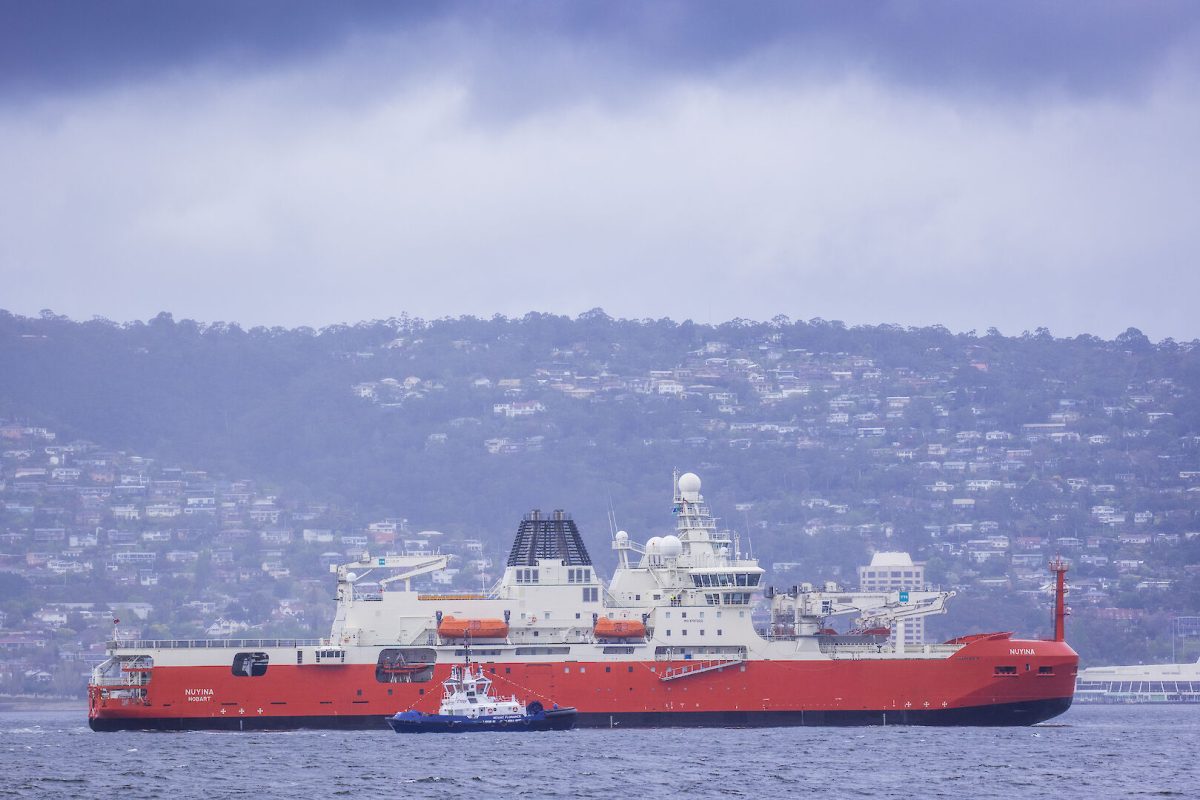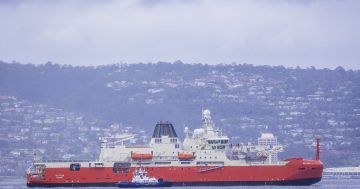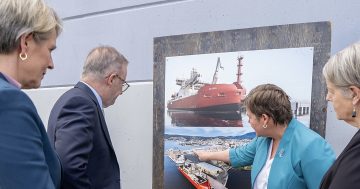
Australia’s most advanced Antarctic research and resupply vessel, RSV Nuyina arrives in Hobart on 16 October 2021. Photo: AAD/Rob Blakers.
Officers and engineers working for Serco on Australia’s newest icebreaker have launched industrial action with the Fair Work Commission over an enterprise agreement they allege “is now behind industry standards”.
Last week employees represented by the Australian Maritime Officers Union (AMOU) and Australian Institute of Marine and Power Engineers (AIMPE) conducted work bans over a period of several days. Serco – which operates RSV Nuyina on behalf of the Australian Antarctic Division – sought an urgent hearing with the Fair Work Commission yesterday afternoon (30 January) as a result of the action.
A spokesperson from the multinational company said this was done in order to resolve the situation quickly and limit any disruption to Antarctic operations.
“Serco respects the right of union members to participate in protected action, although we are disappointed it has come to this,” the spokesperson said.
“We have been fair and reasonable in all offers made to the union and our employee representatives from the outset, and we remain committed to reaching an agreement as soon as possible.”
AIMPE and AMOU launched the action in pursuit of an enterprise agreement, as they attest the current Greenfields Agreement that commenced in 2020 and expired on 6 January 2024 has “fallen behind” the prevailing employment standards.
Serco has indicated to union members they want to preserve the existing conditions, which AIMPE’s Martin Byrne said were well below those on comparable vessels.
“The Nuyina is under-resourced in terms of the number of marine engineers and ETOs (electro-technical officer) required to operate and maintain one of Australia’s most sophisticated bluewater vessels,” Mr Byrne said.
“The Nuyina operates in the harshest conditions of any Australian ship and has the most onboard equipment yet the pay and conditions are less than vessels operating on Bass Strait and well below the rates of pay and conditions that apply to Australia’s research vessel the Investigator, operated by the CSIRO.
“In addition to manning levels and rates of pay, and other standard maritime conditions being sought, is training opportunities. The maritime industry is currently suffering a severe shortage of trained professional engineers and ETOs/electricians and the Federal Government’s merchant marine flagship should be a leader in training just as the previous Antarctic supply ship, the Aurora Australis was.”
On 2 January, the decision to launch a protected action ballot was sent to the Fair Work Commission after Serco had been consulted and was not in objection to the application that sought to ensure the safety of the vessel, other crew members and port.
All of the 17 AIMPE members voting approved most of the actions, which took place during the maintenance period and not its expedition voyage to Antarctica.
The protected industrial action began from 5 pm on 24 January with an overtime ban, escalating to a ban on the use of external contractors working on the vessel the following day, and concluding on the Friday with a 24-hour stoppage.
Throughout all the work bans, AMOU officers and engineers were present to ensure vital onboard services were maintained and could be attended to in the event of any emergency.
Currently the ship is in its home port of Hobart, which it came to following a refuel in Burnie after its last resupply venture to Davis Station in Antarctica.





